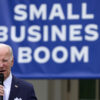President Obama’s “You didn’t build that” comment has drawn much attention. The reactions from both the President’s defenders and his critics illustrate a profound misunderstanding about how the market actually allows us to cooperate.
As Milton Friedman, echoing Foundation for Economic Freedom founder Leonard Reed, pointed out: “not a single person in the world can make [a] pencil.” This may sound strange at first, but the reality is that it takes many people, each with different skills, coordinating with each other from around the world to produce a single pencil. The graphite may have come from Italy, the wood from Oregon, and the rubber in the eraser from Malaysia.
Yet no government direction was needed to bring these people together.
It is the entrepreneur who brings these people and resources together, guided by a market system in which prices determine the most efficient use of resources. Government planners can never match the ability of the market process to facilitate an environment for cooperation and coordination—no matter how intelligent the bureaucrats or how benign the governing elite.
This is not simply theory; the Index of Economic Freedom proves that countries with higher levels of economic freedom are also the most prosperous.
Today, the world economy is much more complex than when Milton Friedman lectured about the production of pencils. Paper and pencil have been usurped by the computer, iPad, and smartphone. Yet as this video from the Institute for Faith, Work and Economics demonstrates, the market process is more important than ever.
A recent study found that for every $299 iPod sold in the U.S., our reported trade deficit with China increases by about $150; however, the value added via the assembly lines in China is only $10, and much of the value added of that so-called deficit is captured in the U.S. by designers, financiers, and owners of intellectual property. A variety of different producers and service providers from many countries contribute to the complex process that puts an iPod on the shelf in an American store. And all that effort is coordinated by Apple, not the U.S. government.
The government has a role in society, but it is only through the market process that individuals can cooperate effectively on a grand scale.
Dylan DelliSanti is currently a member of the Young Leaders Program at The Heritage Foundation. For more information on interning at Heritage, please visit http://www.heritage.org/about/departments/ylp.cfm.




























